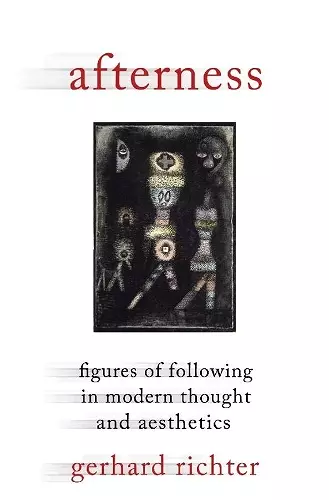Afterness
Figures of Following in Modern Thought and Aesthetics
Format:Hardback
Publisher:Columbia University Press
Published:28th Oct '11
Currently unavailable, and unfortunately no date known when it will be back

Time plays a central role within philosophical and literary encounters with modernity. Once time is no longer thought of in terms of linear progression and is therefore free from the burdens of historicism, what endures as the central demand is thinking the 'after.' In a remarkably nuanced and original work, Gerhard Richter addresses the multifaceted nature of the 'after.' While canonical figures such as Walter Benjamin, Heidegger, Adorno, Derrida, and Arendt form the figures around whom the argument is developed, what emerges is Richter's original contribution to an understanding of time within modernity. In working at the interface of philosophy and aesthetics--a site that modernity demands and rightly privileges--Richter develops a conception of time that stills the pathos of utopianism while holding the future open. The possibility of another beginning resides in the recognition that what occurs 'after' is already taking place. -- Andrew Benjamin, professor of critical theory and philosophical aesthetics, Monash University
Gerhard Richter's groundbreaking study argues that the concept of "afterness" is a key figure in the thought and aesthetics of modernity. It pursues questions such as: What does it mean for something to "follow" something else? Does that which follows mark a clear break with what came before it, or does it in fact tacitly perpetuate its predecessor as a consequence of its inevitable indebtedness to the terms and conditions of that from which it claims to have departed? Indeed, is not the very act of breaking with, and then following upon, a way of retroactively constructing and fortifying that from which the break that set the movement of following into motion had occurred? The book explores the concept and movement of afterness as a privileged yet uncanny category through close readings of writers such as Kant, Kafka, Heidegger, Bloch, Benjamin, Brecht, Adorno, Arendt, Lyotard, and Derrida. It shows how the vexed concepts of afterness, following, and coming after shed new light on a constellation of modern preoccupations, including personal and cultural memory, translation, photography, hope, and the historical and conceptual specificity of what has been termed "after Auschwitz." The study's various analyses--across a heterogeneous collection of modern writers and thinkers, diverse historical moments of articulation, and a range of media--conspire to illuminate Lyotard's apodictic statement that "after philosophy comes philosophy. But it has been altered by the 'after.'" As Richter's intricate study demonstrates, much hinges on our interpretation of the "after." After all, our most fundamental assumptions concerning modern aesthetic representation, conceptual discourse, community, subjectivity, and politics are at stake.
a worthwhile read...a refreshing way to think 'post-modernity' without the brittleness of the 'post'... -- Jill Petersen Adams Continental Philosophy Review [readers are] richly rewarded by a multifaceted survey of the discourse of modernity. -- Klaus Hofmann MLQ Gerhard Richter's rigorously argued book about what he calls 'afterness'... is the lure to thought whose uncertain traces Richter follows through the twists and turns of an enormously suggestive archive, ranging from the work of Kant to Derrida, and from the intricacies of Holderlin's poems to the mise en abyme of Stefan Moses's photographic portraits... Richter's patient tarrying with Nachheit throws into sharp relief the anxious willfulness of those who triumphantly claim to situate themselves 'after theory,' 'after deconstruction,' or 'after the human.' MLN Richter has coined the term 'afterness' to describe the temporal slipperiness of modern experience-he values philosophers and artists that linger with the ephemeral or marginal remainders left over by institutionalized thought and conceptual determination, and the experimental form of his book seeks to both describe and perform this lingering... Richter values the potential for the aesthetic to imagine new collectivities and forms of shared experience and memory. Qui Parle For Richter, coming after should not be misunderstood as merely derivative, belated, or secondary. Instead, he convincingly argues for the recognition of an 'essential' anachronism inherent in any thought that authentically attempts to understand time and history... Richter convincingly connects lucid close readings of particular passages with larger issues of aesthetics, political theory, and philosophy. German Studies Review [Afterness] is a marvel of breadth of vision, precise detail, and depth of thought that philosophers will welcome... We must continue to follow afterness now that Richter's Afterness has appeared, follow it in the sense of Derrida's suivre. To put it formally, after afterness comes nothing that comes-to-be, is to-come, or ever was. Neither the word nor the thing (as, again, Derrida would have said) called afterness can be abandoned or evaded. And that makes Gerhard Richter's Afterness a philosophical event. I conclude my welcoming of it by expressing the hope that Richter will continue with Afterness-for, after all, Hyperion signs his letters to Bellarmin with Nachstens mehr, "More to come, as soon as possible." Research in Phenomenology
ISBN: 9780231157704
Dimensions: unknown
Weight: unknown
272 pages